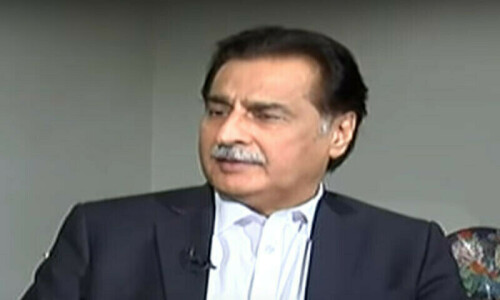KARACHI: Ayaz Sadiq, Speaker of the National Assembly, has stated that he would prefer to wait for the Election Commission of Pakistan’s decision before acting on the Supreme Court’s decision regarding PTI’s reserved seats.
In a colossal meeting with Geo News broadcasted on Sunday, he alluded to the High Court greater part choice on the question of PTI’s saved seats as a “re-composing of the Constitution”, saying the gathering wouldn’t do the court’s structure as the law had been changed — a reference to late corrections made in the Races Act, 2017.
He stated that the Election Commission was the appropriate authority in this regard, and that “if we start listening to courts, there are many decisions… We won’t do it on the court’s order, we will wait for the ECP to notify it.”
Mr. Sadiq responded that he preferred to wait for the instructions on a matter involving parliamentarians despite being informed about court decisions when the interviewer inquired if he held the ECP above the Supreme Court.
Mr. Sadiq also said that members of the Treasury benches had approached him about holding meetings of the Public Accounts Committee (PAC) and taking over as chairman because they had enough members.
However, Mr. Sadiq stated that he had requested that they wait and hoped that some efforts would be directed toward this unresolved issue following the adoption of the 26th Amendment.
Mr. Sadiq acknowledged that due to the continued dysfunction of several parliamentary committees, including the PAC, decision-making remained sluggish.
26th Amendment Mr. Sadiq was questioned about the impression that the judicial reforms implemented actually erode the judiciary’s independence in relation to the changes made by the 26th Amendment.
“On the off chance that parliament can make the Constitution, for what reason mightn’t they at any point select the individuals who need to decipher the Constitution. He asked, “Why can’t we have the provision if it exists in developed nations around the world?” and added that the discussion would continue.
He also said that a constitutional amendment cannot be challenged in court under Article 239, and that the PTI would be breaking the Constitution itself if they tried to do so.
He also talked a lot about how the 26th Amendment was passed, saying that all political parties were consulted over the course of a month and a half. He said that PPP chief Bilawal Bhutto-Zardari and PM Shehbaz Sharif activated their teams and made commendable efforts to secure universal consensus from all political actors, despite the fact that there had been an initial “lack of coordination” on the amendment.
He said that while many things were appreciated and agreed upon privately, every party has its own stance, and the PTI did not back the amendment for political reasons. When asked about the PTI’s decision not to support or vote for the amendment, he stated that
Mr. Sadiq stated categorically when the interviewer mentioned opposition claims regarding the presence of intelligence agency personnel in the assembly: The National Assembly does not receive any agency personnel.
He claimed that when PML-N was in opposition, “we would sit in the opposition leader’s chambers and ‘they’ would come to deal with us on the government’s behalf.” He insisted that there was no such person present at any of the meetings in parliament.
References against ‘turncoats’
Alluding to the issue of ‘PTI-supported’ MNAs deciding in favor of the 26th amendment, Mr Sadiq expressed that according to the ECP, the situation with the four MNAs was ‘autonomous’.
He then gave Adil Bazai, a Quetta independent MNA who had joined the PML-N but remained on the opposition benches, as an illustration. As a ruling party MNA, Mr. Sadiq claimed that he had also sought the chairmanship of a standing committee and development funds, but that he had voted against the parliamentary party’s wishes on important votes like the constitutional amendment.
Mr. Sadiq claimed that the PML-N whip had informed him that they had issued a notice to the MNA regarding his abstention from voting on the Constitutional amendment. He added that once he received a complaint from the party, he would send it to the . However, he stated that if any party has objections, they can move a complaint, and “we will check our records and if it merits a reference, we will move it.”



